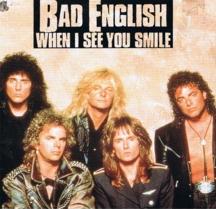| "When I See You Smile" | ||||
|---|---|---|---|---|
 | ||||
| Single by Bad English | ||||
| from the album Bad English | ||||
| B-side |
| |||
| Released | August 30, 1989 | |||
| Genre | ||||
| Length | 4:17 | |||
| Label | Epic | |||
| Songwriter | Diane Warren | |||
| Producer | Richie Zito | |||
| Bad English singles chronology | ||||
| ||||
"When I See You Smile" is a song written by Diane Warren and performed by American-British glam metal band Bad English. It was released in September 1989 as the second single taken from their self-titled debut album released in 1989. The power ballad [4] is the band's most successful song, reaching number-one in both the United States and Canada.